|
|
|
Sort Order |
|
|
|
Items / Page
|
|
|
|
|
|
|
| Srl | Item |
| 1 |
ID:
074081
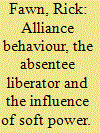

|
|
|
|
|
| Publication |
2006.
|
| Summary/Abstract |
Thirteen post-communist governments gave diplomatic support to the Anglo-American position on Iraq in 2003; many also gave military assistance to the war itself and most contributed to post-war operations. However 'small states' may be defined, none of these 13 actors can be considered a major power in international relations. This article assesses the reasons for their support of the United States. It first considers what material gains they expected and gained, and applies their support of the US against expectations of alliance behaviour. It then contrasts the behaviour of those Central and East European states with that of Belarus and of Serbia. The article then argues that an important explanation for post-communist state behaviour over Iraq comes from an expression of existential values that can be understood through the notion of 'soft power'.
|
|
|
|
|
|
|
|
|
|
|
|
|
|
|
|
| 2 |
ID:
092154
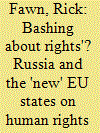

|
|
|
|
|
| Publication |
2009.
|
| Summary/Abstract |
During the August War of 2008, many Western governments that had previously been supporters of Georgia tempered their views on the causes of the conflict and moderated their support for the government of Mikhal Saakashvili. By contrast, the governments of several post-communist countries were forthright in their backing of Georgia. The presidents or prime ministers of Poland, Estonia, Latvia and Lithuania, as well as Ukraine, even travelled to Georgia during the war to demonstrate their solidarity.
|
|
|
|
|
|
|
|
|
|
|
|
|
|
|
|
| 3 |
ID:
075438
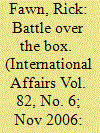

|
|
|
| 4 |
ID:
188135
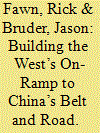

|
|
|
|
|
| Summary/Abstract |
China’s Belt and Road Initiative (BRI) is already changing infrastructure and production across much of the world. The three states of the South Caucasus and their counterparts in Central Asia need diverse connectivity to preserve their economic and political independence amid China’s expanding influence. Despite some rhetoric and practical measures, the United States and the European Union (EU) continue to underestimate the BRI. This article identifies recent international and regional developments that converge to create a unique opportunity for the West and South Caucasus partners. They may develop integrated, long-terms infrastructure of lasting mutual benefit. The convergence of events in and around the South Caucasus offers the place for the West to build an “On-Ramp” to the BRI. The South Caucasus provide a potential gateway into Asia’s heart that is not dictated solely by the priorities of Chinese foreign or commercial policies, just as the Baku-Tbilisi-Ceyhan pipeline of a generation ago served a similar role.
|
|
|
|
|
|
|
|
|
|
|
|
|
|
|
|
| 5 |
ID:
111138
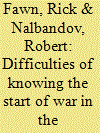

|
|
|
|
|
| Publication |
2012.
|
| Summary/Abstract |
The August War in 2008 generated incompatible accounts of the events causing its outbreak. Through an analysis of Russian language, Georgian language and major English print media, web and television sources, this article provides analysis of the empirical obstacles to objective knowledge; determines what we know, and what remains unknown, and demonstrating what is contested. It then shows the difficulties of being certain of the causes of war, the divergent terms and justifications used, and contends that the start of the war should not be treated as a single event. Rather, the start of the conflict must be understood in terms of an interlinking cycle of events.
|
|
|
|
|
|
|
|
|
|
|
|
|
|
|
|
| 6 |
ID:
190172
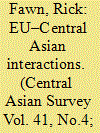

|
|
|
|
|
| Summary/Abstract |
By shifting the study of European Union (EU)–Central Asian relations from its fixed category of black-boxing both the EU and Central Asia, this article advances the case for the approach of examining multi-level and multi-actor interactions that identify the dynamic processes of reciprocal action and meaning-making that characterize the mutual cooperation. It distinguishes perceptions, interests and practices, pointing to the rationales and modes of behaviour of multiple EU and Central Asian actors. The article also advances five reasons why EU studies should take more interest in Central Asia, given that the EU’s larger external relations and security agenda extends to this region. Similarly, it shows that Central Asian studies can benefit from the analysis of the region’s interactions with external actors, including the EU, given that external actors contribute to reshaping national policy agendas and influence everyday life.
|
|
|
|
|
|
|
|
|
|
|
|
|
|
|
|
| 7 |
ID:
111134
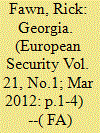

|
|
|
|
|
| Publication |
2012.
|
| Summary/Abstract |
This article places new works in the context of the major implications arising from Georgia's Rose Revolution and the war of August 2008 for both Georgia and the wider Euro-Atlantic area.
|
|
|
|
|
|
|
|
|
|
|
|
|
|
|
|
| 8 |
ID:
047782
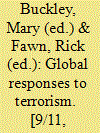

|
|
|
|
|
| Publication |
London, Routledge, 2003.
|
| Description |
xv, 334p.
|
| Standard Number |
0415314305
|
|
|
|
|
|
|
|
|
|
|
|
Copies: C:1/I:0,R:0,Q:0
Circulation
| Accession# | Call# | Current Location | Status | Policy | Location |
| 047118 | 303.625/BUC 047118 | Main | On Shelf | General | |
|
|
|
|
| 9 |
ID:
052766


|
|
|
|
|
| Publication |
London, Frank Cass, 2004.
|
| Description |
241p.
|
| Standard Number |
0714684155
|
|
|
|
|
|
|
|
|
|
|
|
Copies: C:1/I:0,R:0,Q:0
Circulation
| Accession# | Call# | Current Location | Status | Policy | Location |
| 048368 | 327.091717/RIC 048368 | Main | On Shelf | General | |
|
|
|
|
| 10 |
ID:
074565
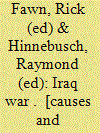

|
|
|
|
|
| Publication |
New Delhi, Viva Books Private Limited, 2007.
|
| Description |
ix, 357p.hbk
|
| Standard Number |
8130904276
|
|
|
|
|
|
|
|
|
|
|
|
Copies: C:1/I:0,R:0,Q:0
Circulation
| Accession# | Call# | Current Location | Status | Policy | Location |
| 051851 | 956.70443/FAW 051851 | Main | On Shelf | General | |
|
|
|
|
| 11 |
ID:
081388
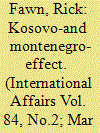

|
|
|
|
|
| Publication |
2008.
|
| Summary/Abstract |
The post-communist space continues to generate new internationally recognized states while incubating unrecognized but de facto states. Recent movement in the Balkans-the independence of Montenegro and the arduous deliberations over Kosovo's future -have variously encouraged other secessionist people and would-be states, particularly in the former Soviet Union. This article analyses the impact of developments in Montenegro and Kosovo on several levels, including: their usage by de facto states; the reactions to them by central governments; Russian policy; and western and intergovernmental responses to these challenges. The article further argues that the Russian position on Kosovo and on the so-called 'frozen' or unsettled conflicts neighbouring Russia could ultimately backfire on it. Western policy towards both Kosovo and on the post-Soviet frozen conflicts will be best served by signalling to Russia, irrespective of the exact form of Kosovo's independence, that neither its own interests nor broader western-Russian relations are served by using or reacting to any Kosovo 'precedent'.
|
|
|
|
|
|
|
|
|
|
|
|
|
|
|
|
| 12 |
ID:
084589
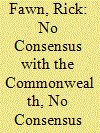

|
|
|
|
|
| Publication |
2008.
|
| Summary/Abstract |
Prime Minister Jean Chr tien considered his decision to keep Canada out of the Iraq War of 2003 as the best of his tenure. That move challenges the previous record of Canada's participation in war with the two Commonwealth countries to which it is most often compared, Australia and the United Kingdom; it was also an apparent departure in relations with the United States. This article, in its first section, argues that the 'decision' was belated and incoherent, and also, relatedly, one that lacked sufficient grounding in Canadian foreign policy traditions. The article hypothesizes in its second section on foreign policy options, arguing further that the Canadian government was unconstrained by expectations of the United States but also that it could have made an essentially cost-free decision, and one tied into a defensible interpretation of Canadian foreign policy traditions.
|
|
|
|
|
|
|
|
|
|
|
|
|
|
|
|
| 13 |
ID:
190175
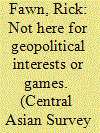

|
|
|
|
|
| Summary/Abstract |
The European Union’s (EU) 2019 New Strategy for Central Asia and joint meetings with Central Asia’s five foreign ministers established standards and expectations for mutual relations. Throughout those initiatives and proclamations, the EU stresses its un-geopolitical essence and behaviour, including the statement that affords the article’s title. The article identifies five issue areas that demonstrate that, despite declarations otherwise, the EU reasons and acts geopolitically in this contested region: (1) the promotion of Central Asian regionalism; (2) the inclusion of Central Asia in formations beneficial to the EU; (3) selectively in economic and functionalist cooperation; (4) democracy, human rights and civil society promotion; and (5) international education cooperation. The EU identifies its comparative advantage through cost–benefit analyses and seeks to enhance its attractiveness by offering its allies to Central Asia, while excluding other, present actors. That the EU is often outmanoeuvred does not diminish this subtle yet discernible geopolitical conduct.
|
|
|
|
|
|
|
|
|
|
|
|
|
|
|
|
| 14 |
ID:
087929
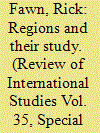

|
|
|
|
|
| Publication |
2009.
|
| Summary/Abstract |
Long a focal point in the study of Geography, regions have become a major concern of International Relations, and for some even its essence. Principle definitions and approaches, however, remain contested, as do the contexts in which and how they matter, from economic to security. This article examines contested views on what constitutes a region and on the nature and functioning of regional architecture, drawing from thematic and case-specific literature to indicate the expanse of analytical enquiry. These include the roles and interpretations of geography, identity, culture, institutionalisation, and the role of actors, including a hegemon, major regional powers and others actors from within a region, both state and societal. A final section indicates additional areas for future research.
|
|
|
|
|
|
|
|
|
|
|
|
|
|
|
|
|
|
|
|
|